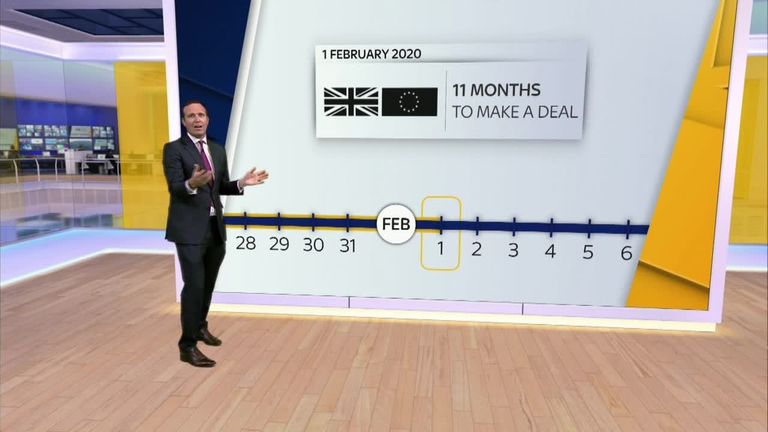Boris Johnson: There will be 'bumps', but Brexit can be 'stunning success'
As Britain leaves the EU, Boris Johnson says it is his job to "bring this country together now and take us forward".
Saturday 1 February 2020 01:08, UK
Boris Johnson has said there will be "bumps in the road" now Britain has left the EU, but expressed confidence that the "opportunity" of Brexit can be turned into a "stunning success".
In a video message released by Downing Street before Britain's departure at 11pm on Friday, the prime minister said it represented an "astonishing moment of hope" for many.
But he also acknowledged that there will be others who "feel a sense of anxiety and loss" at the UK's 47-year membership of the union coming to an end.
Mr Johnson said he recognised those competing sentiments and that it was his job to "bring this country together now and take us forward".
"The most important thing to say tonight is that this is not an end but a beginning," the PM said.
"This is the moment when the dawn breaks and the curtain goes up on a new act in our great national drama."
:: Live updates as Britain leaves the EU
In a symbolic move, Mr Johnson held a cabinet meeting in Sunderland earlier, the first area to back Brexit when the results were announced on referendum night in 2016.
Back in Westminster, the PM hosted a reception in Downing Street.
Guests included cabinet ministers, No 10 advisers and civil servants, officials who were involved in the Brexit negotiations, and supporters of the campaign to leave the EU.
Downing Street was illuminated with a light show, while a new 50p coin to mark Brexit has entered circulation.
Meanwhile, Brexit supporters gathered for a party led by Nigel Farage on Parliament Square.
Earlier, pro-EU demonstrators took part in a procession through Whitehall.
A crowd also gathered across the road from Number 10, brandishing EU flags and anti-Brexit placards.
Candlelit vigils took place place in Scotland, which voted to stay in the EU.
Leave a Light On gatherings were staged in Aberdeen, Dundee, Glasgow, and Stirling, among other locations.
Participants wanted to send a message to the EU to keep open a place for Scotland, amid a renewed bid from the SNP for a second independence referendum.
In Northern Ireland, there were a series of protests in Armagh, close to the border with the Republic of Ireland.
In Brussels, the UK flag has been removed from EU institutions. One Union flag is expected to be placed in a museum.
Labour leader Jeremy Corbyn, who will step down in April, said Britain was now "at a crossroads".
He said there could be an "internationalist, diverse and outward-looking Britain" or one that will "trade our principles, rights and standards to secure hastily arranged, one-sided, race-to-the-bottom trade deals with Donald Trump and others".
Former PM David Cameron, who made the decision to call the EU referendum, said the government "can make a success of the choice that we made".
"I wish the government well in all their endeavours," he added.
Now Britain has left the EU, it enters an 11-month transition period.
This time period, during which the UK will continue to follow EU rules and regulations, will be used to try to sort out the terms of the future relationship between the two sides.
Mr Johnson has vowed not to extend the transition period beyond 31 December, but senior EU figures have warned that striking a deal before then will be difficult.
Irish Prime Minister Leo Varadkar said Dublin would take a firm line in these post-Brexit trade discussions.
His deputy, Simon Coveney, earlier told Sky News that "Brexit is not done".
On the negotiations about the future relationship, he said Mr Varadkar's government would attempt to "get the best possible deal from an Irish perspective".
But Mr Coveney added: "We don't have much time to do it because Boris Johnson has tied his own hands in terms of setting a tight timeline to do that."
This tough tone was repeated by European Council President Charles Michel.
He said the UK's stated policy of not aligning with EU rules post-Brexit means it cannot expect the same levels of market access.
:: Listen to the Daily podcast on , , ,
European Commission President Ursula von der Leyen, meanwhile, said relations would not be as close as when Britain was a member of the EU.
"We want to have the best possible relationship with the United Kingdom, but it will never be as good as membership," she said.










